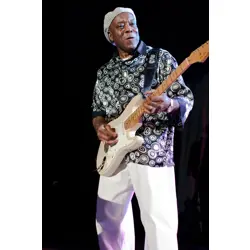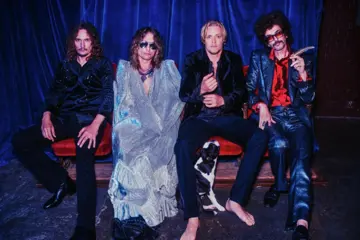 Buddy Guy
Buddy GuyHe started as a protégé of the great Muddy Waters, but before long Buddy Guy had established himself as a larger than life figure deserving of his own page in the blues history books. He's always placed an emphasis on fun with his brand of blues rock, which is an element he still considers vital to this day.
“I was brought up in the Baptist church and we didn't have instruments,” Guy recalls. “My mother and grandmother and all the people around me, the people I was related to would just have fun. They couldn't stand still; they look like they were enjoying it so much. That's the way I feel when I play, I'm so happy. If they tell me to sit in a chair – I know BB [King] does it – but I can't do it! I might jump up and kick the chair off the stage when I feel good. I can't sit here, man. This is too good to sit down on. I gotta get up and let everybody know how I feel.”
He certainly has a lot of energy and at 75 years of age Buddy Guy maintains a fairly hectic performance schedule. When asked how he feels about keeping it up so late in life, Guy just sounds too gracious to ever stop.
“It's sad to say but there's only a few of us left. Me and BB was talking about that about three weeks ago. We are blessed to still be able to go out and make someone happy with our music. I remember when I wasn't invited to the parts of the world that I'm talking to you and I was wondering what was wrong. What did I do wrong to not be invited? And then all of a sudden somebody cares or likes you enough to invite you over there and I'm just overjoyed with that.”
Don't miss a beat with our FREE daily newsletter
Last month Guy was part of a group of blues royalty who performed a special concert at the White House in Washington D.C. While this is a man who has clearly done a lot over the years, you get the feeling this performance was something of a crowning achievement.
“Well, you know, that's a dream,” he beams. “To be invited to play in front of the Commander In Chief, man, I don't have words to explain that. I just hope I don't make him angry! [I hope I] played the right notes for him! I saw a smile on his face when I asked him to come up and sing Sweet Home Chicago. And he did! I thought, 'Oh Buddy, you goin' down in history now, man. You got the President to sing a blues lyric!'
Also playing were the likes of BB King, Mick Jagger, Jeff Beck and Booker T Jones. But Guy is unimpressed by these names - after all, they're his peers. “Well all of those guys are my friends, I been knowin' them. I been close to them before. But I never been that close to the President! To be in the House to play my music was the thrill of a lifetime and that will carry me the rest of my life.”
Buddy Guy's love for Australia is shown through frequent visits over the past decade or so. Though it's his first visit he recalls immediately when thinking about our country. “I got invited to Australia… I think it was 1972. I had never met Arthur Crudup and that's where I met him – in Australia – and he was one of my idols because he was one of Elvis Presley's idols. Those were the good old days. I love the country and I love the people and to keep being invited back by the people down there, it tells me I must have done something right.”
Even a serious dislike of flying isn't enough to keep him away. “I never was in love with flying even before 9/11, you know. To fly that far and to be happy to do it, man… I forget all about flying when I get invited to go down there.”
Nobody speaks fonder of Buddy Guy than the big guns of British blues. The Rolling Stones adore him, Eric Clapton considers him one of his biggest inspirations and Jeff Beck once said of his playing, “I didn't know a Strat could sound like that.” What is perhaps less acknowledged is that Buddy Guy credits these white Englishmen with his own success. “Well in the beginning there was no money, we just did it for the love of music. Muddy Waters and I met some of the people who taught Muddy – the late Son House, Fred McDowell – that's all they played it for. You made a good looking woman smile, you made all the people who were sitting down dance at the Saturday Night Fish Fry. You go to sleep and wake up one day when the British guys exploded the blues and that's when the bigger venues started coming. It was just in Louisiana and Chicago playing the same blues club every night. Then it went worldwide and we began to say, 'Well, I don't have to sleep where it's raining no more, I can sleep in a room with a cover on it. I can eat a decent meal now because I got paid last night.'”
This doesn't mean Guy wasn't shocked when he first heard about the British obsession with blues music. “I was in the studio in 1964, Chess Studios, doing a tune called My Time After A While and they brought these four guys and lined them up against the wall; I almost started cursing because I didn't know what they was doing, I ain't never seen white guys with long hair like that before. I was like, 'Who the hell is this and what the hell are they doing in here?'”
But, like Hendrix, Guy's brand of blues was lapped up by the British. “They accepted the music louder, they accepted Jimi Hendrix with the big Marshall amps and so on. They didn't do that here – the Chess people wouldn't even let us turn those amplifiers up like that,” he admits. “But the British said, 'Bring it on, if that's what you got then give it to us.' Hendrix had to move before he could explore.”
What does Buddy Guy have planned for Australian audiences this time around? “I don't know nothin' else but Buddy Guy. I know somebody's gonna be there [who] probably [has] never heard of me and will go away saying, 'I didn't like him but I know he gave me everything he had,' so that's my plan. I can't hold back. I'm too happy to be invited down there to say, 'Well I can't give it all to you now, I'll save some.' I ain't got nothin' to save, man. You gonna get everything I got.
“My dad and mama used to tell me before they passed away, they'd say, 'Son, don't be the best in town. But please be the best until the best come around.'”

















